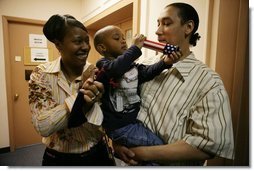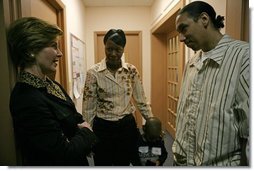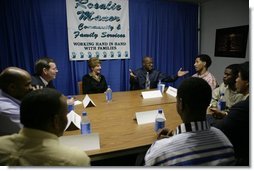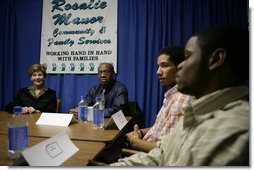
 |
For Immediate Release
Office of the First Lady
March 8, 2005
Mrs. Bush's Remarks at Helping America's Youth Event in Wisconsin
Rosalie Manor Community and Family Services
Milwaukee, Wisconsin
1:15 P.M. CST
MRS. BUSH: Thank you all very much. Thank you, Damion. Thank you all. Damion, you're very, very articulate. You're a great spokesman for Rosalie Manor and I thank you very much for sharing your story with us. It's very important that the people of America hear the stories about the struggles that young men in America face, and also to hear about the courage they are showing to overcome their problems.
 Damion and all the young men today in the Today's Dad program, the
one I just visited, are making responsible decisions to stay involved
in the lives of their children, and their children will benefit greatly
from having a relationship with a loving and responsible father.
Damion and all the young men today in the Today's Dad program, the
one I just visited, are making responsible decisions to stay involved
in the lives of their children, and their children will benefit greatly
from having a relationship with a loving and responsible father.
I have to just say that the person who inspired my whole interest in this issue happens to be here today. He's from Milwaukee. He was the subject of a story in the New York Times Magazine that was published last fall, a year ago, or last September, I guess, or so. And I read it and I was struck by it and thought at the time how we neglect boys in the United States, how we have turned our vision away from everyone except for boys. We let little boys grow up without the nurturing that we give girls and that we know intuitively little boys need. And then, when they are grown, when they're young men, they don't have that foundation from having the nurturing that they need from other men, from their fathers or their grandfathers or their uncles or from someone like Alphonso who can step in and help them in such a profound way.
And Ken, who is here today -- and I was really glad to have a chance to meet him and meet his little boy, because he'd made the choice to take care of his little son and to be a father to his child. And that -- the whole article about him is what made me start thinking about what we could do in our country to make sure all children, girls and boys, are nurtured and get the kind of nurturing that all of us know children need so they can build successful lives.
I'm very happy that Secretary Mike Leavitt is with me today. As he told you, the fathers program here is -- runs on a grant from Health and Human Services. So I'm glad he could come and be with me. And I also want to thank the mayor for being here with me. Thank you very much, Mayor Tom Barrett, for joining us.
And thanks so much to Al Castro and Lindsey Draper. Thank you all, and all the people here at Rosalie Manor for hosting this today.
I'm visiting Milwaukee to talk about this new initiative called Helping America's Youth. The President asked me to lead this effort, and I eagerly accepted. For years, I've worked with children; in schools -- I was a teacher and school librarian, as most of you know; and then since my husband was Governor of Texas and then President of the United States, I've visited many schools and after-school programs around our country that help children who might be at greater risk for getting in trouble. These programs are changing young people's lives for the better, and children and parents across our country need to know what they can do to get help.
 Some trends among youth are heading in the right direction, but
others are not. Risky behaviors, including drug, alcohol, tobacco use,
violence and early sexual activity are still among the top causes for
disease and early death among young people. In addition, more children
are growing up without an involved, committed and responsible father in
their lives. And studies show that an overwhelming number -- and I
think this is very interesting -- of violent criminals in the United
States are males who grew up without a father.
Some trends among youth are heading in the right direction, but
others are not. Risky behaviors, including drug, alcohol, tobacco use,
violence and early sexual activity are still among the top causes for
disease and early death among young people. In addition, more children
are growing up without an involved, committed and responsible father in
their lives. And studies show that an overwhelming number -- and I
think this is very interesting -- of violent criminals in the United
States are males who grew up without a father.
Helping America's Youth will benefit children and teenagers by emphasizing action in three key areas: family, school and community. The initiative highlights the importance in every child's life of a loving, caring adult, whether that's a parent, a grandparent, a teacher, a coach, a pastor or a mentor. In addition to emphasizing community involvement, Helping America's Youth is an umbrella initiative that utilizes several federal programs that already exist or that are new programs proposed in the President's budget.
This fall, we'll convene a White House summit on Helping America's Youth. Researchers, policy experts, educators, parents and community leaders will discuss the best ways to help our children avoid risky behaviors so they can build successful lives. Researchers will identify the causes of problems and suggest the best practices to overcome them. Community groups, including faith-based groups and groups like Rosalie Manor, will tell us what's actually working in the field.
The conference will introduce a new assessment tool that will allow communities across the country to identify the challenges that they face and the services that they already have that help young people, and then where are the gaps. Local leaders can then build off existing government programs, as well as volunteer faith-based or community programs to create seamless efforts to help their local children.
 Over the past month, I've visited several cities across America
where innovative programs to help children are being put into action.
In Baltimore, researchers found that young children need to be taught
how to behave in school, that it doesn't just come naturally. So
teachers and principals are teaching 1st graders how to be good
students through the Good Behavior Game. Twenty years of data show
that 86 percent of the children who were taught with the Good Behavior
Game in the 1st grade ended up graduating from high school, compared to
just 19 percent of their peers, who were not in a well-managed 1st
grade.
Over the past month, I've visited several cities across America
where innovative programs to help children are being put into action.
In Baltimore, researchers found that young children need to be taught
how to behave in school, that it doesn't just come naturally. So
teachers and principals are teaching 1st graders how to be good
students through the Good Behavior Game. Twenty years of data show
that 86 percent of the children who were taught with the Good Behavior
Game in the 1st grade ended up graduating from high school, compared to
just 19 percent of their peers, who were not in a well-managed 1st
grade.
Then I visited a great program in Detroit called Think Detroit that teaches children life lessons through sports. Today in Detroit, more than 650 coaches volunteer their time to mentor thousands of young people across the city, teaching them good character traits while they teach them sports.
And in northwest Pennsylvania -- Philadelphia -- I visited a Boys and Girls Club that has a Passport to Manhood program. Statistics show that boys are having an especially tough time growing up. They're more likely to fall behind girls in school, and more likely to drop out, to join a gang, commit crimes, wind up in prison, and, in fact, there -- fewer men than women are going to college and graduating from college now in the United States.
In the Passport to Manhood program, boys age 8 to 16 meet with a group leader, a lot like the group leaders Mikal and Janeen that I met today, to talk about the character traits that they want to have, and the character traits that they think make men, and then how they can get these character traits themselves. These young men see an ideal of manhood that respects life and women, and rejects violence.
The programs in Baltimore and Detroit and Philadelphia and here in Milwaukee are successful because adults are using games or sports, and mainly communication, to give young people positive messages about education and character.
These adults serve as a counterbalance to negative peer pressure. They serve as a safe harbor in a place of violence. And they serve as an inspiration toward working toward goals like graduating from high school and enrolling in college.
 Research shows that the more children hear positive messages from
adults, the less likely they are to engage in risky behaviors. Parents
and family are the first and most important influence in a child's
life, but we all know that there's no direction book that comes with a
baby. Plenty of parents need help, and organizations like Rosalie
Manor are providing it. Rosalie helps first-time parents of any age,
with a particular focus on teen parents, because teenagers face major
challenges staying involved with their children's lives. They often
struggle with school and finding a job to support their child. And
many teen parents find it difficult to maintain a relationship with
each other.
Research shows that the more children hear positive messages from
adults, the less likely they are to engage in risky behaviors. Parents
and family are the first and most important influence in a child's
life, but we all know that there's no direction book that comes with a
baby. Plenty of parents need help, and organizations like Rosalie
Manor are providing it. Rosalie helps first-time parents of any age,
with a particular focus on teen parents, because teenagers face major
challenges staying involved with their children's lives. They often
struggle with school and finding a job to support their child. And
many teen parents find it difficult to maintain a relationship with
each other.
Research tells us that children need two parents in their lives. On average, children raised in households with two parents perform better in school and have fewer emotional health and behavioral problems. Children who grow up without a responsible and loving father in their lives are more likely to engage in high-risk behaviors, more likely to drop out of school, and more likely to commit crimes. In fact, studies show that each year spent without a dad increase a child's odds of future incarceration by 5 percent. Fatherless boys are also more likely to become teen parents themselves. That creates a cycle of teen parenting and absentee fatherhood that's hard to break. And what I saw today are these young men who are determined to break that cycle, and I want to congratulate them and tell them that they are an inspiration to all of us. The consequences for individual children, and for the communities in which they grow up, can be severe.
Some of the young men who come to Rosalie know what it's like to grow up without a father at home, and they don't want their own children to suffer the same loss. I met Jason at our roundtable discussion earlier today. Jason joined Today's Dads program when he was 16. Without a dad in his own life, he had started making some bad decisions. He got involved with drugs, and wound up dropping out of school. When his girlfriend became pregnant, a friend of Jason's mother referred him to the program. His case manager, Alphonso, that you've already heard about today, says that Jason has shown great growth over the last two years. Jason has been working to support his son, and he's back in school to complete his GED. He's involved in his son's life, and he's maintained a strong relationship with his son's mother. Right now, he's working on finding safe housing for his family.
Two proposed federal programs to help fathers and strengthen marriages are part of Helping America's Youth. The Responsible Fatherhood Initiative would support community- and faith-based organizations that provide education training and other services to help men become involved, committed and responsible fathers, both emotionally and financially. And the Healthy Marriage Initiative would support research into the best ways to keep marriages strong, and would provide funding to help couples form and sustain good marriages.
Schools are obviously the second major influence in a child's life, and over the next decade, our nation will need two million new teachers. And we need to recruit more men and minority teachers, men who will be good role models for the boys in their classrooms.
New research in education now gives us a better understanding of how people at different stages in their life -- young children, teenagers and adults -- respond to different methods of teaching. So we want to make sure that we can get good programs into our high schools so that students who have gotten that far and aren't reading on grade level will be able to catch up.
And communities, of course, are the third major influence in a child's life. Parents and schools rely on other adults in our communities to reinforce positive messages and to help children fill their time with constructive activities. And that's what I saw in the next group that I visited today here at Rosalie Manor, and that is an after-school program that helps children during that time of life and during those times of day to make right choices. The hours between 3 and 6 p.m. are the hours when there are more than 14 million school-age children at home taking care of themselves, and after-school programs like Rosalie's can help those children. And those hours between 3 and 6 are the peak times for juvenile crime. So the after-school curriculum that's developed and used here is a program that can be taken nationwide.
The success of Helping America's Youth depends on organizations like Rosalie Manor. It depends on the individual commitment of every American. The time between childhood and adulthood is too short, as George and I can attest, and every moment in a child's life is precious.
After my visit to Think Detroit, the coaches program, a newspaper reporter asked one of the little boys I met what he thought about my visit. And I was moved when I read in the newspaper story that the little boy simply said, "I wish she could stay here."
Children want us in their lives, and they need us in their lives. And as I've learned from the remarkable men and women like Alphonso that I've met today, each of us has the power to make the difference in the life of a child.
Thank you all very much. Thank you for your efforts to help America's youth, and thanks for being here today. (Applause.)
END 1:30 P.M. CST